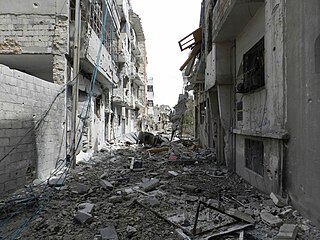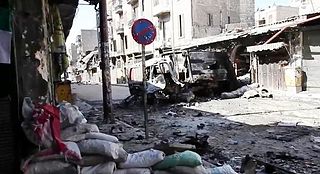
Kofi Atta Annan was a Ghanaian diplomat who served as the seventh secretary-general of the United Nations from 1997 to 2006. Annan and the UN were the co-recipients of the 2001 Nobel Peace Prize. He was the founder and chairman of the Kofi Annan Foundation, as well as chairman of The Elders, an international organisation founded by Nelson Mandela.

Lakhdar Brahimi is an Algerian United Nations diplomat who served as the United Nations and Arab League Special Envoy to Syria until 14 May 2014. He was Minister of Foreign Affairs of Algeria from 1991 to 1993. He served as chairman of the United Nations Panel on United Nations Peace Operations in 2000. Its highly influential report "Report of the Panel on United Nations Peacekeeping" is known as "The Brahimi Report".

The Elders is an international non-governmental organisation of public figures noted as senior statesmen, peace activists and human rights advocates, who were brought together by Nelson Mandela in 2007. They describe themselves as "independent global leaders working together for peace, justice, human rights and a sustainable planet". The goal Mandela set for The Elders was to use their "almost 1,000 years of collective experience" to work on solutions for seemingly insurmountable problems such as climate change, HIV/AIDS, and poverty, as well as to "use their political independence to help resolve some of the world's most intractable conflicts".
Riad Mousa al-Asaad is a Syrian military commander, politician who is the founding leader of the Free Syrian Army. One of the prominent faces of the Syrian Civil War, he led the armed resistance to the Assad regime as commander-in-chief of FSA, during the early phase of the Syrian Civil War. Under Riad al-Asaad's command, FSA expanded into a paramilitary force of 75,000 guerillas and insurgents in March 2012; capable of ousting regime forces from Damascus. He currently serves as the Deputy Prime Minister for Military Affairs of the Syrian Salvation Government, a position he has held since 2 November 2017. He was a former Colonel in the Syrian Air Force who defected to the opposition in July 2011 and became the first Acting Commander-in-chief of the Free Syrian Army.
The Rif Dimashq clashes were a series of unrests and armed clashes in and around Damascus, the capital of Syria, from November 2011 until a stalemate in March 2012. The violence was part of the wider early insurgency phase of the Syrian civil war. Large pro-government and anti-government protests took place in the suburbs and center of Damascus, with the situation escalating when members of the Free Syrian Army (FSA) started attacking military targets in November.

The September 2011 – March 2012 Idlib Governorate clashes were the violent incidents that took place in Idlib Governorate, a province of Syria, from September 2011 and prior to the April 2012 Idlib Governorate Operation.
The following is a timeline of the Syrian Civil War from January to April 2012, during which time the spate of protests that began in January 2011 lasted into another calendar year. An Arab League monitoring mission ended in failure as Syrian troops and anti-government militants continued to do battle across the country and the Syrian government prevented foreign observers from touring active battlefields, including besieged opposition strongholds. A United Nations-backed ceasefire brokered by special envoy Kofi Annan met a similar fate, with unarmed UN peacekeepers' movements tightly controlled by the government and fighting.

The Syrian peace process is the ensemble of initiatives and plans to resolve the Syrian civil war, which has been ongoing in Syria since 2011 and has spilled beyond its borders. The peace process has been moderated by the Arab League, the UN Special Envoy on Syria, Russia and Western powers. The negotiating parties to end the conflict are typically representatives of the Syrian Ba'athist government and Syrian opposition, while the Autonomous Administration of North and East Syria is usually excluded at the insistence of Turkey. Radical Salafist forces including the Islamic State of Iraq and the Levant have not engaged in any contacts on peaceful resolution to the conflict.

The 2012 Homs offensive was a Syrian Army offensive on the armed rebellion stronghold of Homs, within the scope of the Siege of Homs, beginning in early February 2012 and ending with the U.N. brokered cease fire on 14 April 2012.

The Kofi Annan peace plan for Syria or the six-point peace plan for Syria was launched in March 2012 by the Arab League and the United Nations (UN), when the violent Syrian conflict or civil war had raged for a year.
The following is a timeline of the Syrian Civil War from May to August 2012. The majority of death tolls reported for each day comes from the Local Coordination Committees, an opposition activist group based in Syria, and the Syrian Observatory for Human Rights, another opposition group based in London.
The Houla massacre was a mass murder of civilians by Syrian government forces that took place on May 25, 2012, in the midst of the Syrian Civil War, in the town of Taldou, in the Houla Region of Syria, a string of towns northwest of Homs. According to the United Nations, 108 people were killed, including 34 women and 49 children. While a small proportion of the deaths appeared to have resulted from artillery and tank rounds used against Taldou, the U.N. later announced that most of the massacre's victims had been "summarily executed in two separate incidents". UN investigators have reported that some witnesses and survivors stated that the massacre was committed by pro-government Shabiha. In August 2012 UN investigators released a report which stated that it was likely that Syrian troops and Shabiha militia were responsible for the massacre, concluding that: "On the basis of available evidence, the commission has a reasonable basis to believe that the perpetrators of the deliberate killing of civilians, at both the Abdulrazzak and Al-Sayed family locations, were aligned to the Government. It rests this conclusion on its understanding of access to the crime sites, the loyalties of the victims, the security layout in the area including the position of the government’s water authority checkpoint and the consistent testimonies of victims and witnesses with direct knowledge of the events. This conclusion is bolstered by the lack of credible information supporting other possibilities."

The Battle of Anadan was a ten-hour-long armed confrontation between the rebels of the Free Syrian Army and soldiers of the Syrian Army that occurred when FSA forces attempted to overrun a large army checkpoint in the Anadan area. At the end of the battle, FSA fighters successfully seized the checkpoint.

The siege of Wadi Deif refers to the siege of two Syrian Army bases, Wadi Deif and Hamadiyah, by rebel forces, starting on 11 October 2012, during the Idlib Governorate clashes of the Syrian civil war.

The U.S.–Russia peace proposals on Syria refers to several American–Russian initiatives, including joint United States–Russia proposal issued in May 2013 to organize a conference for obtaining a political solution to the Syrian Civil War. The conference was eventually mediated by Lakhdar Brahimi, the United Nations peace envoy for Syria.

The Geneva II Conference on Syria was a United Nations-backed international peace conference on the future of Syria with the aim of ending the Syrian Civil War, by bringing together the Syrian government and the Syrian opposition to discuss the clear steps towards a transitional government for Syria with full executive powers. The conference took place on 22 January 2014 in Montreux, on 23–31 January 2014 in Geneva (Switzerland), and again on 10–15 February 2014.
Ahmad Fawzi is an Egyptian-born media spokesperson, who, for six months in July 2017, worked as Communication Adviser and Chief Spokesperson for the High Commissioner for Refugees. In 2015–2016 he served as interim Director of the United Nations Information Service in Geneva.

The early insurgency phase of the Syrian civil war lasted from late July 2011 to April 2012, and was associated with the rise of armed oppositional militias across Syria and the beginning of armed rebellion against the authorities of the Syrian Arab Republic. Though armed insurrection incidents began as early as June 2011 when rebels killed 120–140 Syrian security personnel, the beginning of organized insurgency is typically marked by the formation of the Free Syrian Army (FSA) on 29 July 2011, when a group of defected officers declared the establishment of the first organized oppositional military force. Composed of defected Syrian Armed Forces personnel, the rebel army aimed to remove Bashar al-Assad and his government from power.

The 2012–2013 escalation of the Syrian Civil War refers to the third phase of the Syrian Civil War, which gradually escalated from a UN-mediated cease fire attempt during April–May 2012 and deteriorated into radical violence, escalating the conflict level to a full-fledged civil war.










